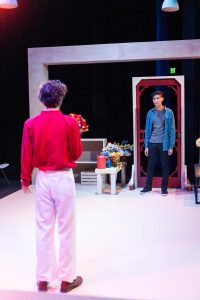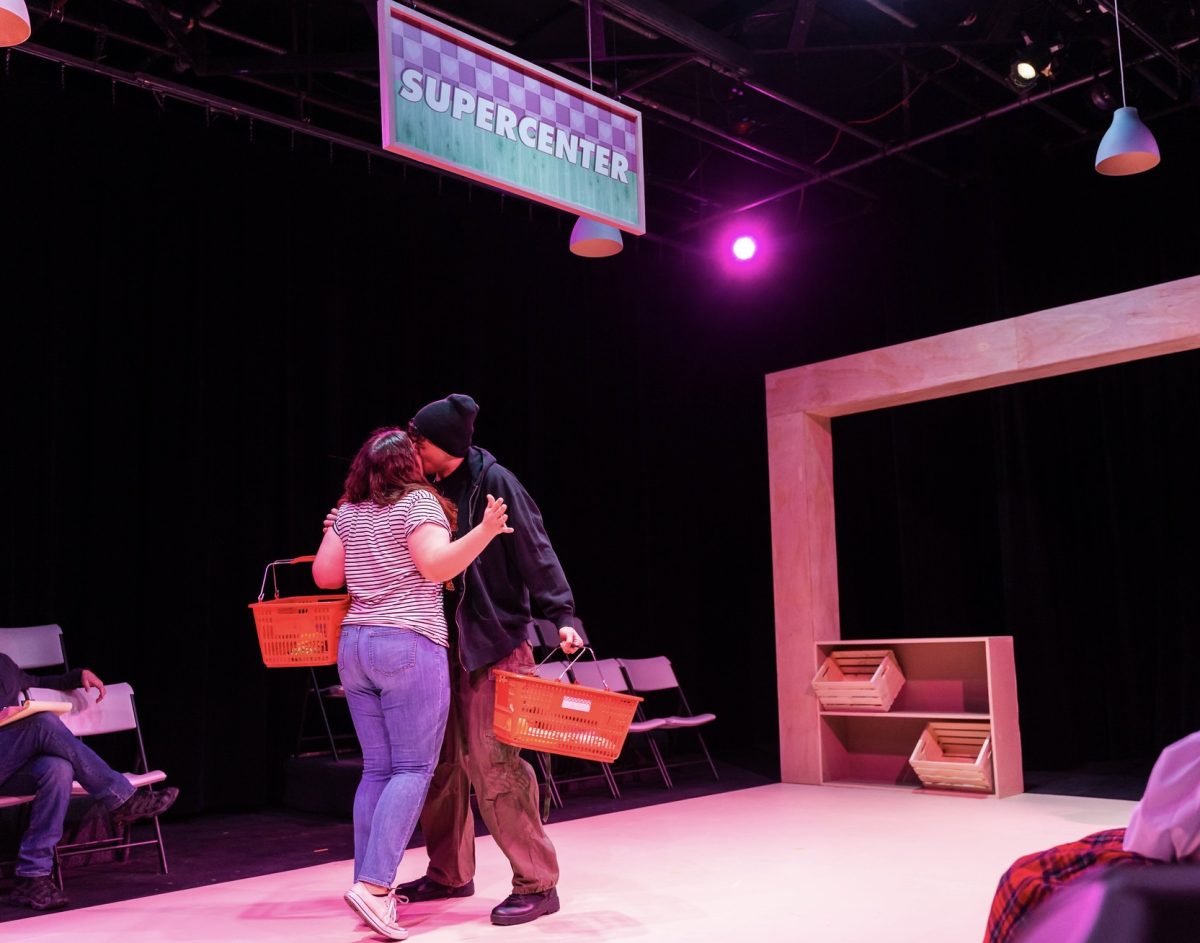
When first entering the Appolliad Theatre for the Mesa College Theatre Departments’ December production of “Love Sick,” it’s clear this play is going to be different. The stage has a condensed performance area. The chairs on the stage indicate the audience will be sitting on the stage, in a round, instead of the usual house seating. Hanging over the stage is a large sign that says, Super Center. Theater in the round is far more intimate than the normal theater where the fourth wall is projected outward towards the audience. The audience is now thrust onto the stage giving the actors a staging challenge and no escape from the audience viewpoints.
The author and playwright John Cariani, describes how this play differs from most. “Love Sick” is a one-act, nine-play cycle about love and loss. Each play has its own arc that tells a story about a couple at a crossroads in their relationship. Since every relationship becomes more advanced than the previous relationship an arc emerges, and the individual plays contribute to create a satisfying whole..” Each vignette is meant to be told simultaneously, perpetuating different, complex moments in a relationship. It also has fun Easter eggs that cleverly correlate to the Super Center. This play is the darker cousin to another Cariani play, “Almost Maine.” Rather than sweet and tender love stories, Cariani takes us through a series of amusing moments when love makes you sick.
When asked why this particular play was presented at this time, Director and Drama Department Faculty Chair George Yé responded, “The size of the company dictates what we’re gonna do. We wanted to look at the students’ needs and wants, but also challenge them as well.”
The company, which is composed of students, was cast wonderfully. The actors developed relationships that were believable, mixed with all the confusion, loss, and guilt that comes with love. Stand outs include Paula Luévano and Kateri Reape in the second play “The Singing Telegram.” What happens when a singing telegram shows up on your doorstep? This is the question, character Louise Overbee, played by Luévano, is faced with, to her overwhelming delight. “He must be asking me to marry him!” she concludes. Once the singer, played by Reape, discovers to whom she is to deliver the message and that Ms. Overbee might have it all wrong, she gets cold feet knowing the contents of the message. The two actors have a delightfully fun back and forth as they bring this old time way of communicating back to life.

Luis Meraz and Darien Brown were perfect in “What?!?” a story of when those three scary little words, I love you, come out, but are missed. Repeating such a difficult, venerable phrase, only to hear, “what?!” was heart wrenching and hilarious. The actors took us around and around as they experienced the excitement of new love, but also the fear that comes with allowing yourself to be loved.
In “Uh-Oh,” actor Luna Camitan plays a murderously bored wife named Sarah, who pulls a gun on her husband played by Darien Brown. As she threatens to kill him, he melts into a sorrowful slump only to be sprayed in the face by a water pistol. “I got it from the Super Center,” Sarah said, laughing. Her practical joke was nothing to worry about.. or was it?
The play’s final scene, “Destiny,” brings the audience back to the Super Center where another chance meeting of star-crossed lovers occurs. The problem is that these lovers, Jake and Emily, played by Mark De Caprariis and Elizabeth Benson, have already been married twice. Once to each other and once to another set of spouses, both separated again. They see each other and are instantly taken back to that time when they were together. They rehash all the ups and downs of why they broke up and what happened. Was this another opportunity to start over? Was this coincidence an alignment of the stars to bring them back together forever, or just dumb-luck?
“Love Sick” took the audience through tremendously intricate arcs of emotion delivered with precision by the cast. The entire production and direction was spot on detailing the dilemma of love. When one thinks of love, one thinks only of the moments of falling in love, but what happens afterward? Traditionally the deal is to commit to love for a life-time, but rarely does one fully understand what that entails. What is certain is that love needs laughter. Love needs communication, and love is going to make you sick.


